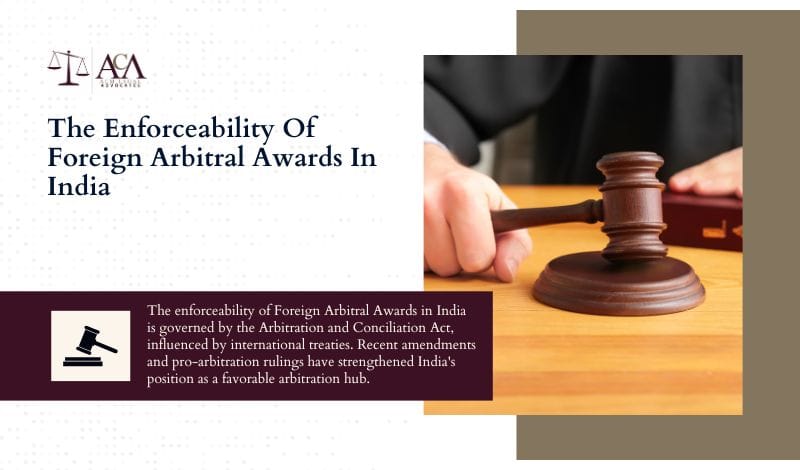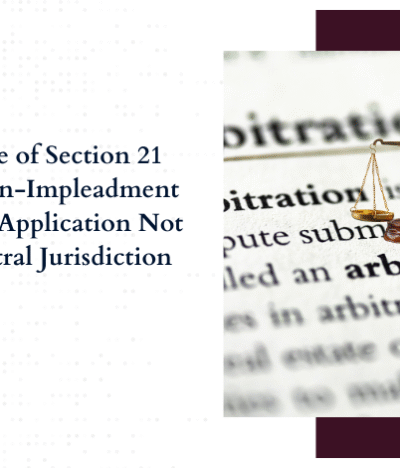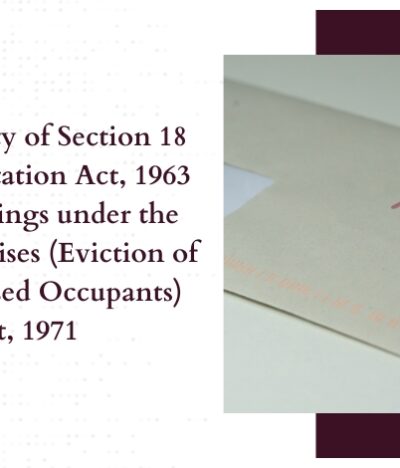In our globalized world, international trade and business transactions have become the norm. As a result, disputes arising from these transactions often find their way into the courts. However, many parties prefer arbitration as a method of dispute resolution due to its confidentiality, flexibility, and efficiency. A critical aspect of arbitration is the enforceability of Foreign arbitral awards in India.
This article aims to explore the enforceability of foreign arbitral awards in India, shedding light on relevant laws, recent developments, and practical implications.
Foreign Arbitral Awards in India and the circumventing legal provisions
Arbitral awards are decisions made by an arbitrator or a panel of arbitrators in a dispute resolution process. They are generally recognized as binding on the parties involved, akin to a court judgment. However, the enforceability of Foreign arbitral awards in India can vary significantly depending on the local laws and international treaties in place.
The enforceability of foreign arbitral awards in India is primarily governed by the Arbitration and Conciliation Act, 1996 (the Act). The Act is influenced by the UNCITRAL Model Law on International Commercial Arbitration, which aims to promote uniformity in arbitration practices globally.
Section 44 defines a “foreign award” and sets the criteria for its recognition in India. A foreign award must be made in a country that is a signatory to the New York Convention on the Recognition and Enforcement of Foreign Arbitral Awards, 1958.
Section 48 lays down the grounds on which enforcement of a foreign arbitral award in India can be refused. The Supreme Court of India, in the catena of judgments, has held that the period of limitation for enforcement of foreign arbitral awards in India shall be 3 years in terms of residuary provisions under Article 137 of the Schedule of the Limitation Act 1963.
The Role of Public Policy
The Interim Report of the International Law Association states, “it is notoriously difficult to provide a precise definition of public policy in the context of enforcement of Foreign arbitral awards in India”. The principle of public policy is based on a legal maxim: Ex dolo malo non oritur actio which means that no court will lend its aid to a man who finds his cause of action on an immoral or illegal act
In pursuant to general judicial perceptions on public policy the Indian Arbitration and Conciliation Act, 1996 lays down public policy as a ground for setting aside foreign arbitral awards in India.
The Case of ONGC v. Saw Pipes has seemingly taken a pro-arbitration stance in dealing with the conflict of an arbitral award. The decision of the Supreme Court however reversed the narrow approach taken in Renusagar’s case by broadening the standard and scope of public policy. In Saw Pipes, the arbitral award was challenged on the ground that it conflicted with the public policy of India.
The court held that the expression ‘Public Policy’ has a wide interpretation and stated, “It would be clear that the phrase ‘public policy of India’ is not required to be given a narrower meaning.”
The court included another standard of violation of Public policy in addition the the heads mentioned in the Renusagar case which was “patent illegality” of the award. Patent illegality was defined under associate builders to mean “making of the award was induced or affected by fraud or corruption.” The concept of patent illegality was read into the principles of public policy laid down in Section 48 of the Act which cannot be taken in international arbitrations and is solely applicable in domestic arbitrations, owing the the changes brought down through the amendment of 2015.
The term ‘fundamental policy of Indian Law was construed widely by the Supreme Court in ONGC V. Western Geco International Limited, which included the Wednesbury principle of reasonableness along with three juristic principles:-
- Wednesbury principle of reasonableness: It provides power to the party to challenge the actions of administrative authorities on the grounds of reasonability. The test was laid down in the infamous case of Associated Provincial Picture House v. Wednesbury Corporation (1948)
- Judicial approach: The court being the supreme adjudicating authority in a country must refrain from acting arbitrarily and decide the case solely based on the merits without affecting the rights of a citizen.
- Principles of natural justice: The courts are obligated to follow the principles engraved in the constitution while dealing with the rights of an individual
The jurisprudence post the 2015 amendments were incorporated in the case of ssyangyong Engineering and Construction Co. Ltd. v. National Highway Authority of India and Cruz City 1 Mauritius Holdings v. Unitech Limited the court narrowed down the judicial interpretation of the term fundamental policy of Indian law as laid down in the case of Western Geco and held that the aforementioned expression would be relegated to the juristic principles laid down in the Renusagar case.
The courts could not interfere with the merits of the award and the only interference possible was on the grounds of violation of principles of natural justice, similar to the Wednesbury grounds were no longer good law.
Furthermore, it was the finding of the court that the provision of settling down a Foreign arbitral award in India on the ground of public policy must be an objection of such a nature that it offends the core values of India’s national policy and connotes the basic and substantial rationale, values and principles which form the bedrock of laws in our country.
The court in Renusagar Power Co. Ltd v. General Electric Co. laid down the narrow scope of public policy limiting it to grounds of only fundamental policy of India. To test any award against the standard of Public Policy, the effect of enforcement of the foreign arbitral awards in India would be looked into rather than different aspects of the award.
The term ‘Public Policy’ has such a wide interpretation that it provides an unfettered power to the aggrieved party to approach the court against the said award thereby negating the purpose of the legislation. The Arbitration and Conciliation Act, 1996 which came into being after the judgment of the Renusagar’s case was meant to narrow the supervisory jurisdiction of the courts and that the court should not go contrary to the legislative intent of the parliament
Recent Developments in Foreign Arbitral Awards In India
In recent years, the Indian judiciary has increasingly favoured a pro-arbitration approach, facilitating the enforcement of foreign arbitral awards. The amendments to the Arbitration and Conciliation Act, particularly in 2015 and 2019, further streamlined the process and reduced judicial interference.
For instance, the 2019 amendment clarified that foreign arbitral awards in India would be enforced unless the parties could substantiate their claims against enforcement based on the specific grounds laid out in Section 48. This shift indicates a growing recognition of the importance of international arbitration and a commitment to maintaining India’s position as a favourable arbitration hub.
Conclusion
The enforceability of foreign arbitral awards in India is a dynamic and evolving area of law, shaped by legislative changes and judicial interpretations. While challenges remain, recent trends indicate a growing commitment to honouring international arbitration agreements. By understanding the legal framework and engaging in best practices, businesses can enhance their confidence in utilizing arbitration as an effective dispute resolution mechanism.
FAQs
1. What is a foreign arbitral award?
A foreign arbitral award is a decision made by an arbitration tribunal that is seated in a country other than India. For it to be enforceable in India, the country where the award was made must be a signatory to the New York Convention.
2. What grounds can be used to challenge the enforcement of a foreign arbitral award in India?
The grounds for challenging enforcement include incapacity of parties, invalidity of the arbitration agreement, disputes not covered by the agreement, improper tribunal composition, and violation of Indian public policy.
3. How has the interpretation of ‘public policy’ evolved in India regarding foreign awards?
Indian courts have increasingly interpreted ‘public policy’ in a narrow sense, promoting enforcement of foreign arbitral awards in India unless there is a clear and compelling reason to deny enforcement based on justice and fairness.
4. What recent developments have positively impacted the enforceability of foreign arbitral awards in India?
Recent amendments to the Arbitration and Conciliation Act, along with pro-arbitration judicial rulings, have streamlined the enforcement process and reduced judicial interference, promoting India as a favourable arbitration venue.
5. Why is it essential to draft arbitration clauses carefully?
Well-drafted arbitration clauses clarify the terms of arbitration, such as the seat, governing laws, and procedures, enhancing the likelihood of enforceability in case of disputes.
Understanding the enforceability of foreign arbitral awards in India not only aids in navigating the legal landscape but also empowers businesses to engage in international transactions with greater confidence.
By embracing arbitration, parties can foster a more efficient and effective resolution process for disputes that may arise in the course of their global dealings.



![R.P Garg V. The Chief General Manager, Telecom Dept & Ors. [2024 Insc 743] R.P Garg V. The Chief General Manager, Telecom Dept & Ors. [2024 Insc 743]](https://www.acmlegal.org/wp-content/uploads/2024/10/R.P-Garg-V.-The-Chief-General-Manager-Telecom-Dept-Ors.-2024-Insc-743-60x52.jpg)


